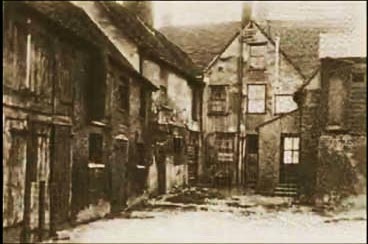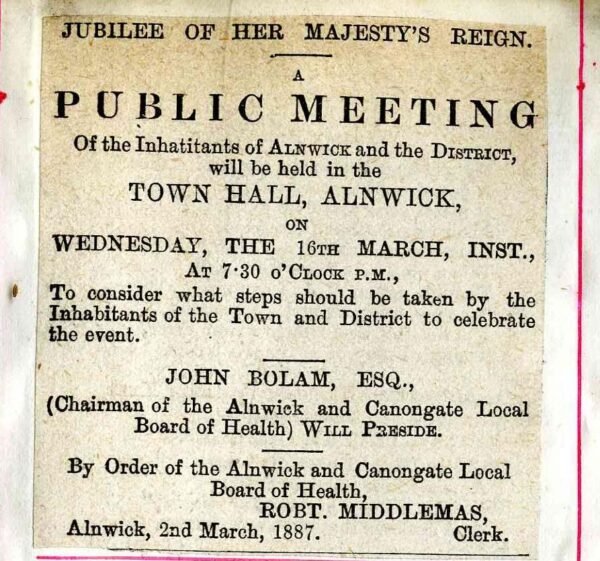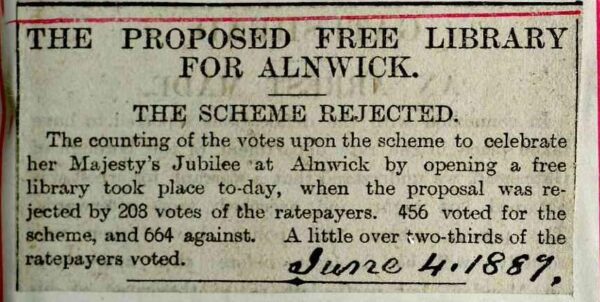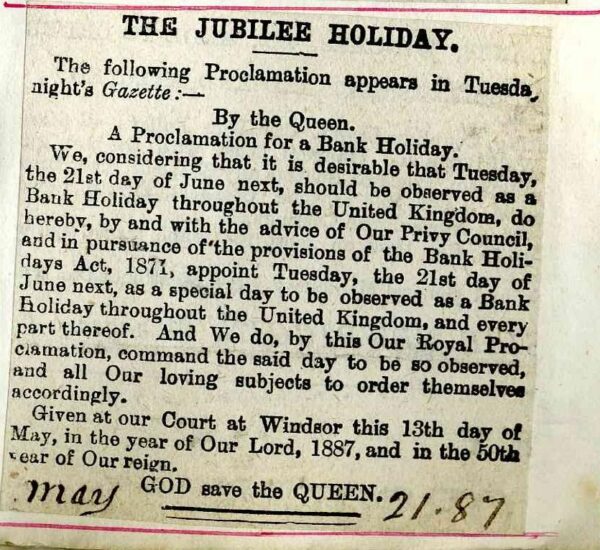ALNWICK GOLDEN JUBILEE CELEBRATIONS, 1887
As we have marked two major royal celebrations recently, with the Platinum Jubilee celebrations for the reign of Elizabeth II in June 2022 and the coronation of King Charles III in May 2023, it is interesting to look at how such occasions were marked in Alnwick and the surrounding area in the past.
The Bailiffgate Museum collections include a series of scrapbooks, probably compiled by Henry Hunter, of interesting stories, gleaned from local newspapers and magazines, in the last two decades of the 19th century. Amongst the treasures in the scrapbooks are details of how our predecessors approached marking Queen Victoria’s Golden Jubilee and how the Jubilee Day was celebrated.
Planning for the Jubilee
Planning by residents in the town started in late 1886, with suggestions for permanent structures to commemorate the jubilee. These included the erection of a model lodging house for tramps and the homeless, suggested by ‘A Ratepayer’ in a letter to the local paper in December 1886. Someone writing as ‘Another Ratepayer’ supported this idea, stating that it “would be the means of getting quit of the frightful state of overcrowding in lodging houses so frequently reported upon by the Medical Officer of Health”. Unfortunately for its supporters, this scheme was abandoned in July 1887 as the local ratepayers felt it would not be self-supporting but would be a “constant charge on the rates of the town”.

Union Court-One of the poorest parts of Alnwick in the 1800's
A public meeting of Alnwick ratepayers on Wednesday March 16th, 1887, put forward various suggestions as memorials of the Jubilee. These included building almshouses, a new Corn Exchange and a covered market for the sale of eggs, butter etc. on a site to be excavated on Market Hill. Another, and apparently the most popular, suggestion was to establish a Free Library in Alnwick, under the Public Libraries Act of 1850, which gave local boroughs the power to establish free public libraries. Mr C. Percy proposed that the most fitting memorial of the Jubilee would be to build such an institution. He stated that it would benefit the poorer classes, who could not afford to pay for access to other educational institutions and would be a means of stopping youths from going to the bad. The money to create the Free Library would be raised by public subscription and by adding a penny in the pound to the rates.

The idea of a Free Library caused quite a stir in the town, judging by the numerous, and frequently anonymous, letters to the local papers about the idea. On April 2nd, 1887, A.B. wrote a long letter, praising the enthusiasm of those at the meeting, but pointing out that a new Free Library would put the Mechanics Institute’s nose out of joint and that paying for such an endeavour would increase the financial burden on the ratepayers. A.B. suggested that all ratepayers should be given the opportunity to vote on the suggestion. Other correspondents referred to such votes in London and elsewhere. Some were in favour of the idea of a Free Public Library, but the majority were against it, mostly on the grounds of cost.

Eventually a vote was held in June 1887, and the idea was rejected, with the votes 465 for and 664 against. Just over two thirds of the ratepayers voted. Eventually, no permanent memorial of the jubilee was built.
How the Town Celebrated
Queen Victoria issued a Proclamation in May 1887, stating that Tuesday, 21st June was to be a Bank Holiday. It was decided that the Jubilee in Alnwick should be celebrated with a grand procession, feasting and a ball. Although none of the monies raised for the celebrations from public subscriptions would be spent on decorations, people were encouraged to hang their own bunting. This call appears to have been answered enthusiastically, with flags and streamers hung across streets, portraits of the Queen, flags and floral decorations displayed in shop windows.

The day itself began with a peal of bells from St Paul’s Church and a service of thanksgiving at St Michael’s Church at 10am. A further special service was held in St Paul’s at 5pm.
The main event of the day was a grand procession, which assembled in Market Place and included all the schoolchildren in the town, each issued with a flag to wave. The procession was led by Earl Percy, followed by two 40-pounder Armstrong guns, then regimental units and their bands. Then came the members of the various committees who had organised the events. These were followed by the clergy, ministers and professional gentlemen of the town, the town and borough councillors, representatives from various organisations, the teachers and schoolchildren, who walked 4 deep, the Hotspur Brass band and choirs. It was estimated that the procession reached almost a mile in length. They marched round Market Place, before proceeding via Market Hill, Fenkle Street and Narrowgate into and through the castle, out by the Lion Gate and to the grounds below the castle. Various activities then occurred there, including a military parade, a feu de joie, fired by the battery of the Percy Artillery, followed by three “hearty British cheers”. This was followed by the National Anthem, performed by bands and choirs. At noon a royal salute of 50 guns was fired by the Percy Artillery, during which the procession reformed and proceeded back to the Market Place via Denwick Lane, Bondgate, Bondgate Within and Fenkle Street.
The dinners included a distribution of 2,520 lbs of bread, in 6 lb loaves, and 1,680 lbs of beef to 419 poor families, to be consumed in their own homes – to ensure that every family had a “plentiful feast” on Jubilee Day. The inhabitants of the Alnwick Workhouse would also receive what was described as “Christmas fare”.
Following the procession all the children, almost 2,000 in all, marched to the castle, for a dinner provided by the Duchess of Northumberland. The Children’s Dinner was held in the Riding School, which had been specially fitted up for the purpose. After eating, the children sang the National Anthem and were presented with a Jubilee medal, before moving to the castle grounds for games, sports and prizes.
A Public dinner, presided over by Lord Percy, was held in the afternoon in the Corn Exchange. This was followed by a Public Ball in the evening. A display of fireworks from the Battery Terrace and a bonfire ended the day. Tickets were required for both events, though the cost was described as being very reasonable.
All in all, Alnwick celebrated in fine style on June 21st, 1887.

